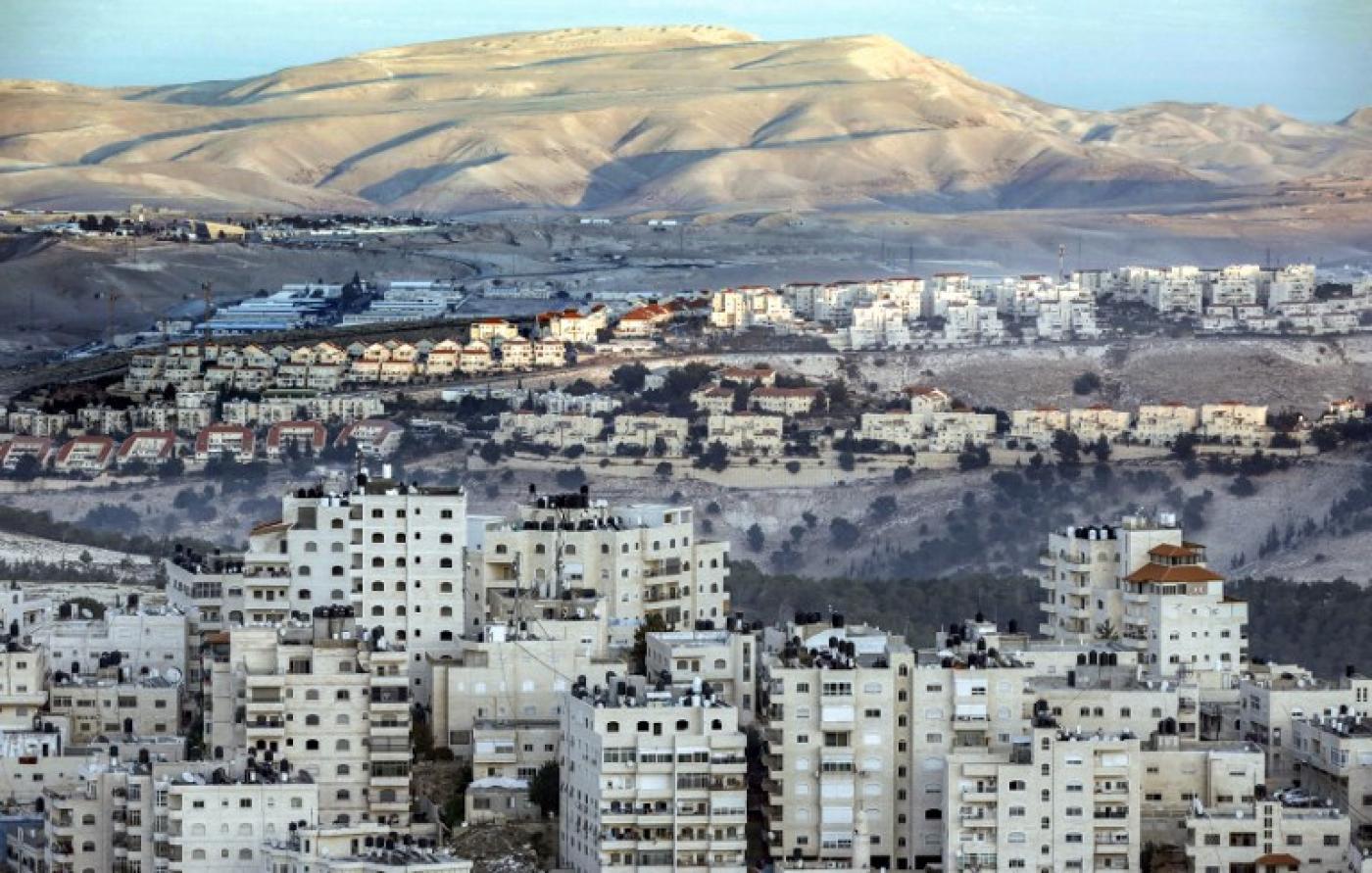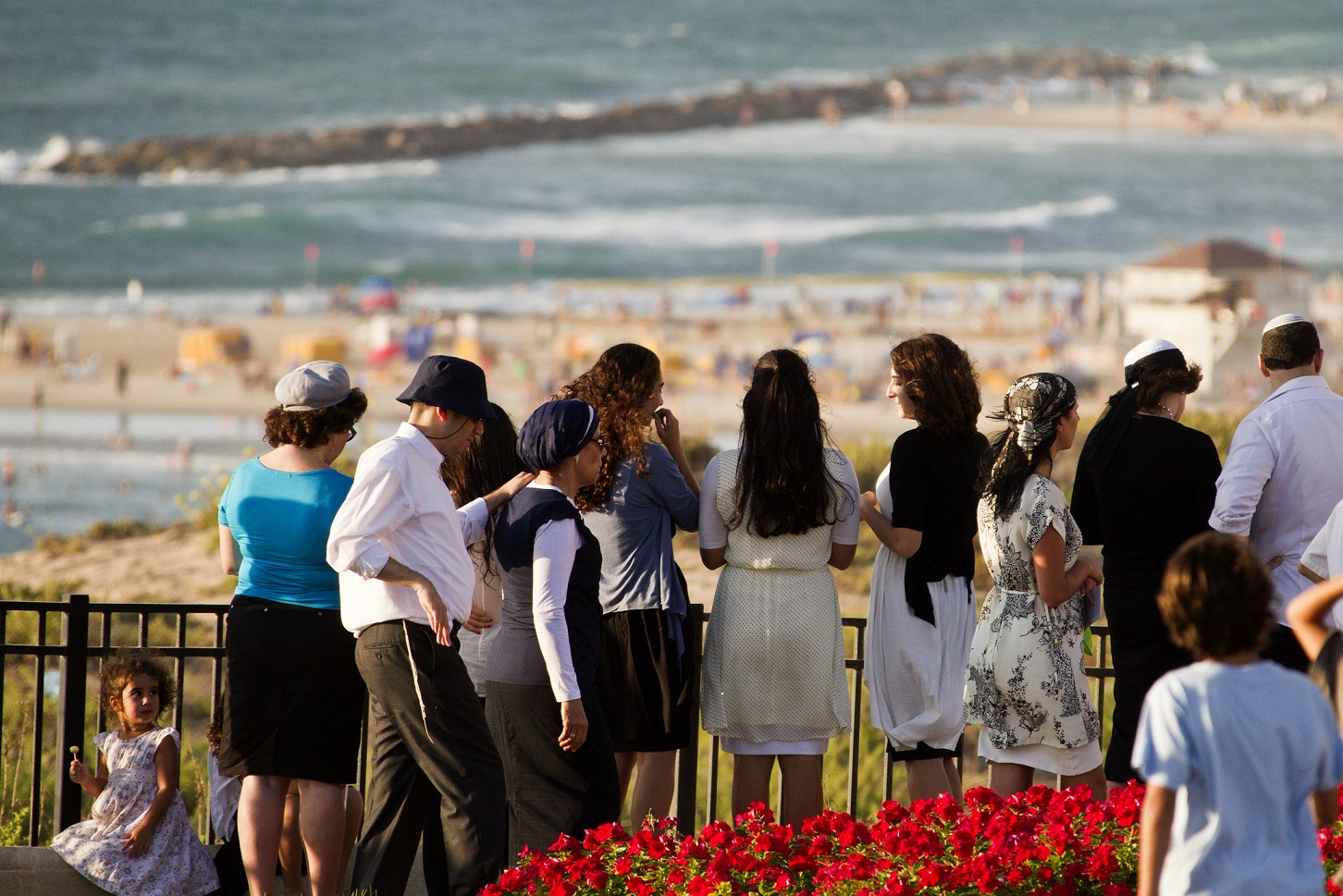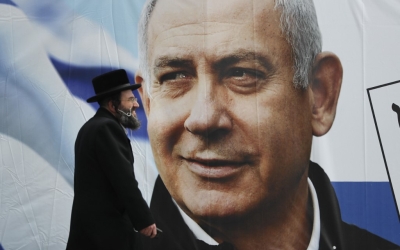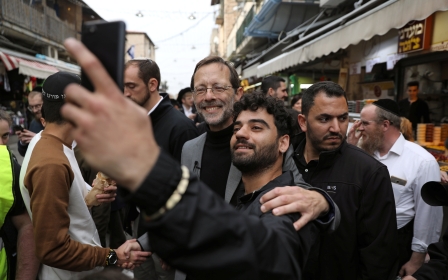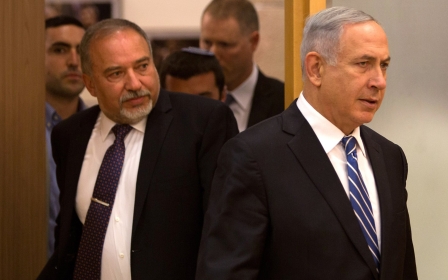Israel's French community: Right-wing, religious and insular
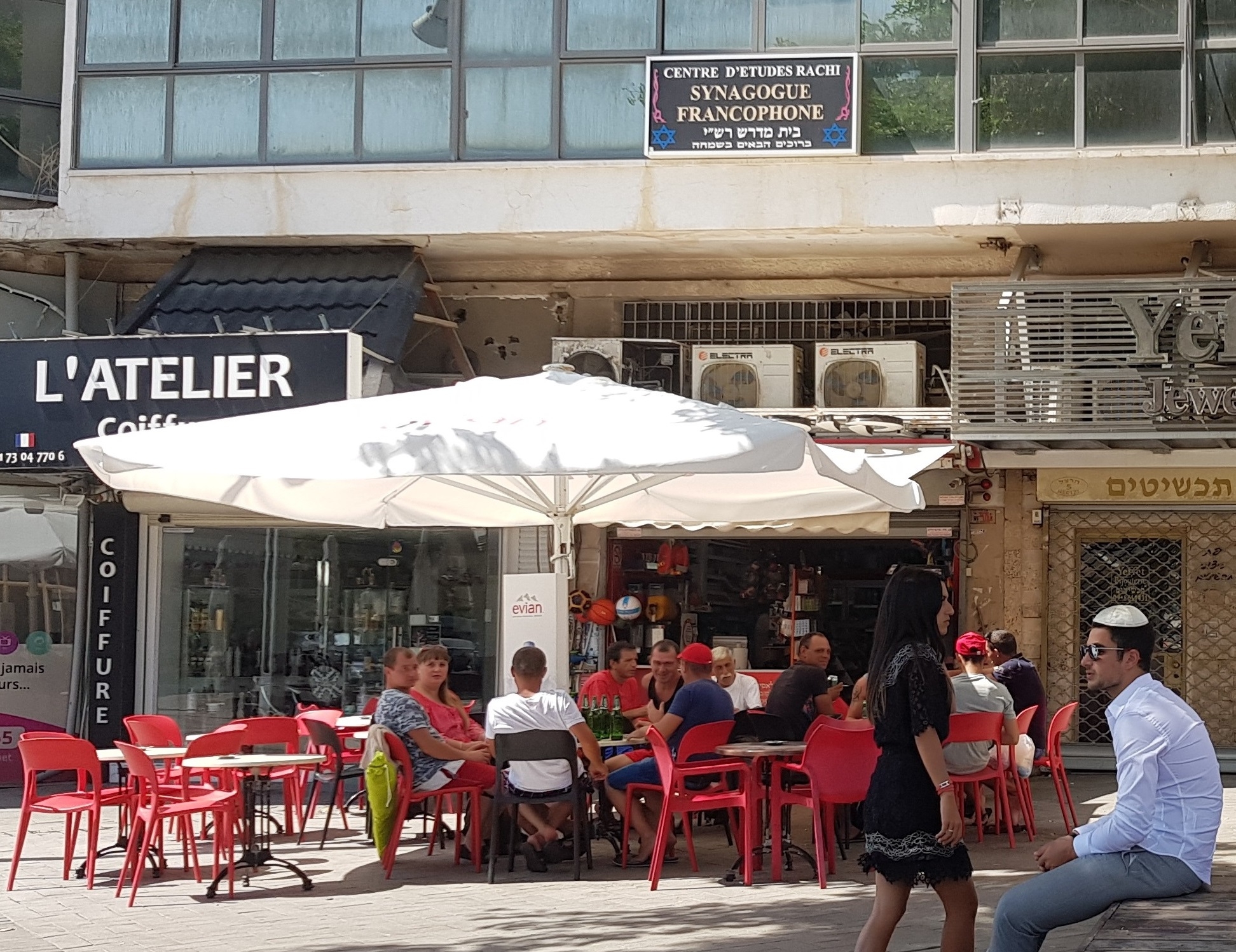
In Netanya, an hour north of Tel Aviv, the Jewish day of Shabbat is spent at the beach. In the water, under beach umbrellas and on cafe terraces, the air reverberates with Hebrew, a little Russian - but mostly French.
“This place is heaven,” says 65-year-old Rachel Atlan, tossing her towel onto a beach chair in the pristine setting.
“I love it here. There are Jews everywhere. It’s home!”
The former beautician from the suburbs of Paris retired here in 2014. She first tried her luck in the 1990s during the Gulf War, but was forced to move back after a year and a half, after she found it impossible to settle and find work in Israel without speaking perfect Hebrew.
‘I love it here. There are Jews everywhere. It’s home!’
- Rachel Atlan, retired beautician
“Life is hard. Israelis don’t really accept us, we don’t live like they do,” she tells Middle East Eye.
New MEE newsletter: Jerusalem Dispatch
Sign up to get the latest insights and analysis on Israel-Palestine, alongside Turkey Unpacked and other MEE newsletters
But this hasn’t stopped her from having very set ideas about what would be “her” ideal Israel: a Jewish state unrestricted by United Nations-imposed borders.
When asked about Israelis living in settlements - civilian communities deemed illegal under international law – in the occupied West Bank, Atlan’s answer is clear: “Why shouldn’t they go there?”
What about the Israeli Basic Law, the country's equivalent to a constitution, which holds that the state of Israel’s Jewish identity supersedes the values of equality and democracy?
“We waited thousands of years for a state of our own,” she replies. “The law is important. The country needs to remain predominantly Jewish, after all.”
Meanwhile, Benjamin Netanyahu - “Bibi” as Atlan affectionately calls the prime minister in power since 2009 - is “in her heart”, as well as in the hearts of many in Israel’s French community.
An estimated 150,000 French people have immigrated to Israel since 1967. Today, roughly 250,000 Israelis hold French passports and maintain a certain degree of contact with France, 100,000 of whom were not born in Israel.
Out of the 6.3 million voters registered in Israel, the French vote is hardly critical; the French are, however, almost certain to join the right-wing coalition Netanyahu is counting on to remain in power after the 17 September elections - especially after his attempts to form a coalition government failed in April, forcing Israelis to return to the polls.
In 2018, a rare survey conducted by Israeli newspaper Makor Rishon found that 72 percent of French-Israelis living in the country vote for the right, with 26 percent saying they vote for Likud, Netanyahu’s party.
From kibbutz to settlement
On the streets of Jerusalem, Netanya and Ashdod, residents wearing kippahs, French football jerseys and speaking Hebrew-tinged French are a common sight.
Most arrived in the past twenty years, yet immigration began as early as the late 1960s and early 1970s.
The French nationals who settled in Israel at the time were mostly Ashkenazi Jews of Central and Eastern European descent. Most were socialist and non-religious and had been raised on Zionist ideals.
Their goal: to establish kibbutzim and participate in building the country.
‘In the ’50s, ’60s and ’70s, Zionists’ ultimate goal was to establish a kibbutz. Today, they want to live in a settlement.’
- Itzhak Dahan, academic
Nowadays, immigrants from France are more religious. The overwhelming majority are Sephardic Jews of North African descent, often motivated by fears of antisemitism, whether real or perceived.
Sarah, 55, is on holiday in Netanya. While she currently lives in France, she also has Israeli citizenship, and her children were all born in Israel, where she lived for several years in the 1990s and hopes to resettle in a few months’ time. One of her sons is currently doing his mandatory military service in the Israeli army.
“France today seems set on abandoning its Jews altogether,” she comments bitterly. In France, she has been insulted for being Jewish on several occasions.
“During the al-Aqsa [Second] Intifada in 2002, there was an increase in anti-Jewish sentiment in France,” says journalist Antoine Spire, co-author of the Dictionary of French Judaism since 1944.
But it was the March 2012 killing of three pupils and a teacher at a Jewish school in southern France - known as the Merah affair - which “fanned the flames,” Spire says, and sparked a new wave of emigration.
The number of French Jews making aliyah - immigrating to Israel, literally “ascent” in Hebrew - surged from just under 2,000 immigrants per year to a record 8,000 in 2015.
The number of incoming migrants has since decreased - and the total figure for Israel’s French population needs to be adjusted, Spire says. According to the journalist, between 25 to 30 percent of French immigrants to Israel eventually move back to France.
“It’s an enormous percentage,” he tells MEE. Most departures are motivated by economic reasons. Integration can also be difficult for some, particularly given the language barrier.
While most newcomers settle in Jerusalem, Netanya, Tel Aviv, and Ashdod, according to Itzhak Dahan, a sociology researcher at Bar Ilan University, some 5,000 French Jews live in Israeli settlements in the occupied West Bank.
Settlements are illegal under international law and are condemned by both the international community and France as an impediment to a two-state solution - but Dahan says these factors are not taken into consideration by the French-Israelis who choose to live there.
“In the 50s, 60s and 70s, Zionists’ ultimate goal was to establish a kibbutz.” Dahan tells MEE. “Today, they want to live in a settlement. It’s ‘the Biblical Land of Israel’, they say, ‘It’s our birthplace, our roots’.”
Take a hard right
While few have actually settled in the West Bank, many French nationals living within the Green Line support the Israeli government’s stance on the occupied Palestinian territories, supporting policies that would be labelled, at times, as far-right in France.
Dahan says it’s understandable given their background.
“[If someone is] North African or Sephardic, with traditional values and fairly religious beliefs, then you can be pretty sure that person votes on the right,” he says.
The French, unlike other Israelis, tend to get more religious when they settle in the “holy land,” he says.
'They don’t wear kippahs in France. They start wearing them when they move here'
- Itzhak Dahan
“They don’t wear kippahs in France. They start wearing them when they move here.”
“Questions of identity tend to make people retreat into religion,” says Benjamin Lachkar, who leads the Likud party’s French-speaking campaign ahead of the 17 September elections.
According to Lachkar, the French in Israel are “old-school right-wing,” much more concerned with the regional context and security issues than they are with the economic issues most other Israeli voters see as a foremost concern. For them, voting Likud means endorsing the policies of Israel since Netanyahu was elected in 2009.
John, a Frenchman who moved to Netanya four years ago, says he votes for Netanyahu. He says he simply follows the herd since he knows little about the other candidates.
“The left-wing here is a bit like in France, a little too pro-Arab,” he tells MEE. “We’re worried they’ll give in to too many demands.”
The father of an eight-month-old son, he unabashedly defends Israel’s right-wing and far-right policies - the bombing and blockading of Gaza, the partial annexation of the West Bank, and the consolidation of Israel’s image and its bellicose policies abroad.
Living in a French bubble
And yet, John didn’t serve in the military, a decision he regrets as he believes it would have helped him integrate into Israeli society.
For Lachkar, this is an example of the French paradox in the country: they idealise Israel but do not really assimilate into it.
“They maintain a somewhat ambiguous relationship to France. There is no going back for them, and yet they stay up to date with what is going on there,” says Lachkar.
Atlan says so herself - without French TV, she couldn’t “survive”.
Even in politics, the influence of French immigrants is minimal. They turn out to vote in large numbers, but they don’t become active party members.
At the local level, “they don’t take part in town life, either. They stay to themselves,” Lachkar remarks.
“They are used to the state providing everything the way it does in France. But here, if you don’t speak out, no one pays any attention to you,” he adds.
The Likud organiser hopes to convince them to join the party and to have more of a say in the political life of Israel.
As Dahan points out, “there is not just one kind of olim [immigrant] from France. Yet, they don’t integrate as well as the other aliyah from Western countries do.”
The language barrier is partly responsible, of course, but so are their misgivings.
“Some are afraid of living in cities where there isn’t a large French community, and they don’t speak any Hebrew after 10 or 15 years.”
Then there are those who travel back and forth on a weekly basis.
“The ‘Boeing aliyah’ as I call them leave for Paris every Sunday morning and return on Thursday evening,” Dahan says. “There are easily two planeloads of them on any given Sunday.”
Spire says this disconnect explains why the French in Israel lean so far to the right.
“As the realities of life in Israel become more apparent, and they get more involved in Israeli society, the very French immigrants who considered themselves unconditional [Netanyahu] followers are starting to realise that a more nuanced position is necessary, that a broader range of policies is possible,” says Spire.
For the time being, however, the right is by and large the most prominent political affiliation in Israel, where it has ruled unchallenged for over a decade, and where nuances are few and far between.
The upcoming election is a showdown not between the right and the centre-left, but between different nationalist factions.
- The article is an edited translation of a story originally published on Middle East Eye's French website.
Middle East Eye delivers independent and unrivalled coverage and analysis of the Middle East, North Africa and beyond. To learn more about republishing this content and the associated fees, please fill out this form. More about MEE can be found here.



